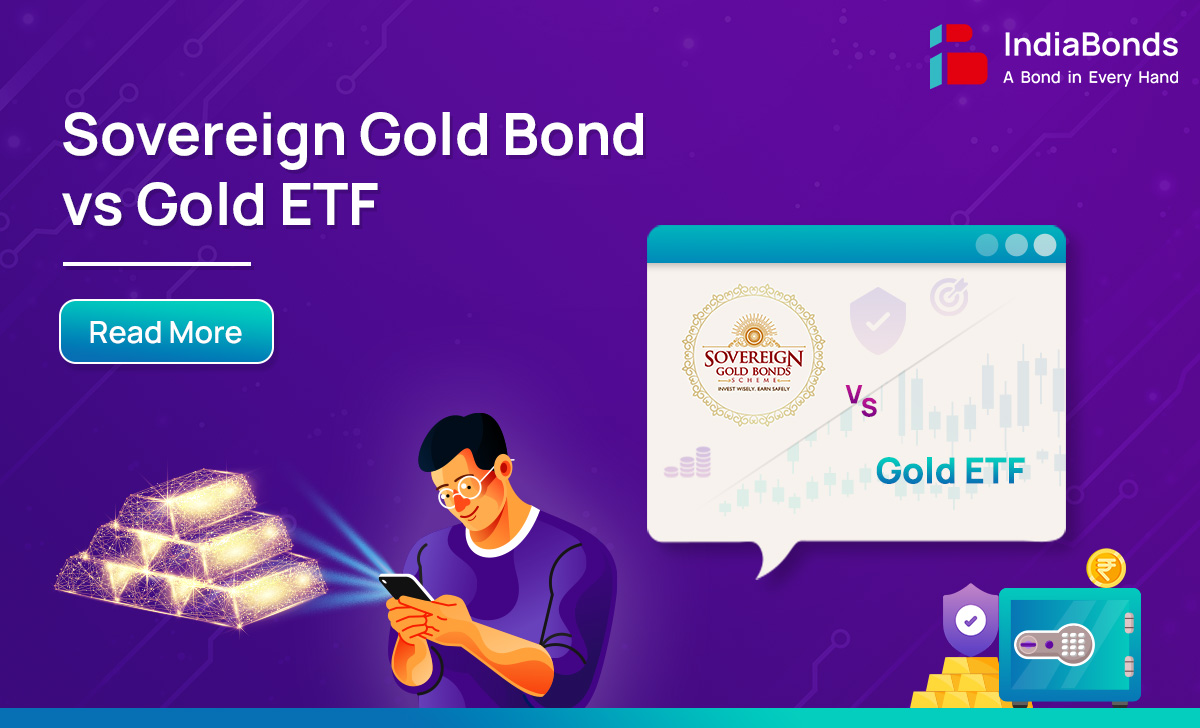Sovereign Gold Bond v/s Gold ETF

Gold has always been a popular choice for people who want to invest. This is especially true in India during holidays like Akshaya Tritiya and Diwali when buying gold is considered auspicious. Because of the ever-increasing cost of actual gold, millennials are turning to more convenient and less risky ways to invest in the yellow metal, such as buying gold in paper form.
If you want to invest in gold in paper form, the best options are sovereign gold bonds (SGBs) or Gold Exchange Traded Funds (GETFs). Investing in SGB and Gold ETFs, are both low-cost ways to get exposure to the precious metal.
Investors get gold with a purity of 999, and they don’t have to pay for things like storage costs, making charges or have fears of theft etc. SGBs and Gold ETFs are both great investment options. But which of the two is better, read on to find out.
Sovereign Gold Bond: What is It?
If you’re looking to invest in gold but don’t want to deal with the hassle of buying actual bullion, Sovereign Gold Bonds (SGBs) may be the right option for you. Bonds are a type of financial security that promises to pay back the principal amount borrowed as well as the interest.
The Reserve Bank of India (RBI) is responsible for the issuance of Indian government sovereign gold bonds (SGB). Here the issuer is Government of India which is the safest and only risk-free issuer in the country. Bonds are issued to investors who must pay an initial cash price and allow for the redemption of the principal in cash. These bonds can be held in Demat accounts.
Interest is paid regularly, and bondholders are repaid based on the bond’s value and the price of gold at the time of redemption. As an individual investor, you can buy sovereign gold bonds with as little as one gram and as much as four kilograms of gold per fiscal year. Sovereign gold bonds have a maturity of 8 years and pay interest at a rate of 2.50% per annum paid semi-annually on the initial investment value. Importantly, any capital gains made, due to appreciation in underlying gold price, is exempt from taxation when the bond is held to maturity.
What Exactly Do You Mean by Gold ETFs?
Exchange-Traded Funds (ETFs) that track the domestic pricing of physical gold are referred to as gold ETFs. These funds are passive investment products that are based on gold prices and construct a basket of physical gold as their holdings.
Through a Demat account, customers can invest in gold exchange-traded funds (ETFs), which are very similar to regular ETFs. One gram of gold can be purchased with one unit of the Gold ETF.
These exchange-traded funds (ETFs) are traded in a manner that is analogous to that of equity trading, and as a result, they are listed on a variety of stock exchanges, including the National Stock Exchange and the Bombay Stock Exchange.
Gold exchange-traded funds (ETFs) are the sole means for investors to profit from price fluctuations in actual gold on the market, even though they do not supply physical gold to investors. When they are sold, gold ETFs provide investors with a cash equivalent based on the current price of gold in the domestic market.




What are the Differences Between SGB vs. Gold ETF?
There are many differences between sovereign gold bonds and gold exchange-traded funds (GETFS):
| Featured | SGB | Gold ETF |
| Lock-in | It is a tradable investment instrument and is listed on Stock exchanges like BSE and NSE. | There is no lock-in period for gold exchange-traded funds. |
| Tenure | 8-Years | None |
| Payment | Can buy and make payment online easily | Digitally like any equity purchase. |
| Where to buy | You can buy sovereign gold from banks, stock brokers, and online investment platforms. | You can buy gold exchange-traded funds through stock brokers. |
| Minimum Investment | 1 unit or 1 gram | 1 unit or 1 gram |
| Maximum Limit | Individual, HUF: 4 kg for each family member. | No limit |
| Collateral | SGB can be used for collateral | GETF cannot be used as collateral. |
| Tradability/Exit Route | Tradeable on an exchange; withdrawal from the 5th year. | Tradeable on exchange. |
| Returns | The return for SGB is greater than gold’s actual rate of return. | The return for GETF is lower than the actual return on gold. |
| Interest Rate | 2,50% per annum | None |
| Capital Gains Tax | No capital gains tax on appreciation if held to maturity. | Long-term capital gains are taxed after three years. |
| Expense Ratio | No expense ratio. | Gold ETF has an expense ratio of 0.50% – 1% approximately. |
SGB is a great choice if you want to invest in gold for a long time since it has an eight-year maturity period. In addition, unlike investing in gold ETFs, investing in SGB will earn you an additional 2.5% per year on your investment.
Also, you shouldn’t put more than 10% of your whole portfolio into gold investments, whether they are real gold or paper gold. When comparing these two ways to invest, it’s important to consider taxes, fees, and returns, among other things.
Key Takeaways
When it comes to cost, liquidity, and taxation, gold exchange-traded funds (ETFs) and sovereign gold bonds (SGBs) each have their own advantages and disadvantages. SGBs are a great investment with a longer term investment horizon and planning for a future event. The annual interest income plus the capital gains tax benefit means that you have potential to make big gains when held to maturity.
You might also want to consider gold exchange-traded funds if liquidity is your primary priority and you have a short term trading view on the price of Gold
SGBs can be easily bought on IndiaBonds platform and you can learn much more about this product here.
FAQs
1. What is the lock in period for Sovereign Gold Bonds and Gold exchange-traded funds?
Both are exchange tradable instruments with no lock-in period.
2. How can you buy sovereign gold bonds?
Banks, stock holding companies, and agents are all places where you can purchase sovereign gold bonds. You can also easily buy online on IndiaBonds platform.
3. Will my money be safe if I invest in SGBs?
A loss of investment value is possible if the gold price drops. Yet the investor suffers no loss in terms of the gold units for which he has already paid. As these are issued by the Government of India, they are the safest in terms of any credit risk of issuer.
4. Sovereign Gold Bond (SGB) – what is it? Who exactly is the issuer?
Government bonds that are measured in gold grams are called SGBs. Basically, they are a stand-in for gold bullion. Both the issue price and the redemption value of the bonds will be paid in cash to the investors. The Reserve Bank issues the bond on behalf of the Government of India.
Disclaimer: Investments in debt securities/ municipal debt securities/ securitised debt instruments are subject to risks including delay and/ or default in payment. Read all the offer related documents carefully.













































